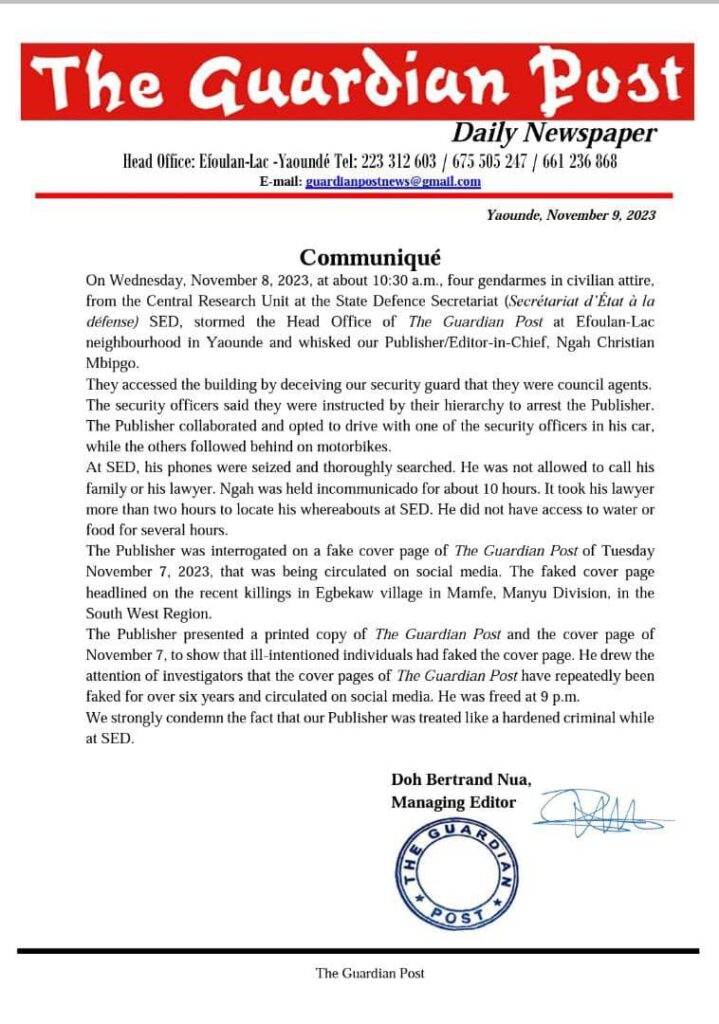Fake news is a term that refers to false or misleading information that is presented as factual news. It can have serious consequences for the public, such as influencing their opinions, emotions, and actions. In this case, the publisher of The Guardian Post was arrested for a fake cover page. Fake news can also undermine the credibility and trustworthiness of legitimate news sources.
The Guardian Post is a daily English-language newspaper based in Yaounde, Cameroon which publishes 7 times a week. The newspaper has been operating since 2001 and has won several awards for its journalism practice.
The newspaper covers various topics, such as politics, economy, culture, sports, and entertainment. It also reports on the ongoing conflict in the Anglophone regions of Cameroon, where there is a violent confrontation between the government and the separatist fighters who want to create an independent state called Ambazonia.
Fake Cover Page
On November 7, 2023, The Guardian Post newspaper published issue number 2952 with the banner headline reading, “Nation in Shock Over Barbaric Killings in Mamfe!” The headline referred to the massacre of over 20 civilians in Egbekaw village, near Mamfe, a town in the South West Region of Cameroon, by suspected Amba fighters, who are separatist rebels fighting for the independence of the Anglophone regions.
However, this issue was edited by propagandist and shared on social media. The banner headline was changed to “Gov’t Admits Soldiers Committed Mamfe Massacre”. The headline falsely claimed that the government acknowledged that the military was responsible for the killings in Mamfe. Three of the other stories on the front page were also altered to make false and sensational claims about the government and the military. The fake cover page also used a different font, text and colour than the original newspaper.


Difference between the Cover Page
The fake cover page was designed to look like the issue number 2952 of The Guardian Post, which was published on November 7, 2023. The original cover page had the following differences from the fake cover page:
- The banner headline read “Nation in Shock Over Barbaric Killings in Mamfe! – Suspected Amba fighters kill over 20, injured many in Egbekaw village – Some of the victims roasted to death in their sleep, several houses razed.” instead of “Government Admits Soldiers Committed Mamfe Massacre”.
- The first story read “Editorial – Hypocrisy at Yaounde La francophonie Conference” instead of “Editorial – Government soldiers confess to killing civilians in Mamfe, reveals names of commanders”.
- The second story read “Why Fally Ipupa, Ben Decca headlining CAMTEL’S Mega December Concert.” instead of Images of a burnt house.
- Third story read “For fostering gov’ts import substitution policy: Private investors hail Investment Promotion Agency.” instead of “8 Cameroonian soldiers and 6 Ex-Amba fighters from DDR centre Buea confessed to the gruesome killing of civilians in Mamfe”.
- The fourth story read “Nico Halle dedicates fresh awards to CONAC boss, journalists” instead of “Biya’s forces extrajudicially executing civilians in Mamfe in apparent war crimes”.
I’ll intentioned people circulated the fake cover page on social media platforms such as Facebook, and other social media platforms, where hundreds of users may have believed it to be true. The fake cover page also caused serious trouble for the publisher and editor-in-chief of The Guardian Post, Ngah Christian Mbipgo. Security forces arrested and interrogated him for 10 hours on November 8, 2023. They accused him of spreading false information and inciting violence.
Publisher’s Arrest
A communique released on the 9 of November describing the circumstances leading to the arrest, and during the interrogation of the publisher was release.

Continued Disinformation
Unfortunately, the fake cover page of November 7 was not the only case of disinformation that targeted The Guardian Post newspaper recently. On November 9, issue number 2954 was still faked by propagandists. The fake cover page changed the headline and some of the stories to make false and inflammatory claims about the arrest of the publisher.


Steps for Fact Checking
Step 1: Check the source
The first step to spot fake news is to check the source of the information. Who is the author or publisher of the news? What is their reputation and credibility? Do they have contact information or a website? Do they have a history of producing reliable or unreliable news?
In this case, the source of the information is The Guardian Post newspaper. However, the information did not come from the newspaper’s website or social media platforms, but from a fake cover page that was circulated online. If SED had done their fact checking, they would have realized that it was a fake cover page. Because we do not have the culture of fact checking, this incident resulted in the publisher being arrested.
Step 2: Check the content
The second step to spot fake news is to check the content of the information. What is the tone and style of the writing? Is it factual or opinionated? Is it clear or vague? Is it consistent or contradictory? Does it use reliable or unreliable sources? Does it provide references or citations?
In this case, the content of the information in the fake cover page are sensational, emotional, and biased. The writing is not factual, but opinionated and misleading. It leaves out important details and context.
Step 3: Check the evidence
The third step to spot fake news is to check the evidence of the information. What kind of evidence is provided to support the claims? Is it visual or textual? Is it original or manipulated? Is it relevant or irrelevant? Is it sufficient or insufficient? The fake cover page has images used out of context to support their fake banner headline.
Step 4: Check the context
The fourth step to spot fake news is to check the context of the information. When and where was the information published or shared? Who is the intended audience or target of the information? What is the purpose or goal of the information? How does the information relate to the broader situation or issue?
The Anglophone crisis is a complex and multifaceted problem that has its roots in the history, culture, and politics of Cameroon. Cameroon is a bilingual and multicultural country, with two official languages: French and English. The Anglophone crisis escalated in 2016, when lawyers and teachers in the Anglophone regions went on strike to protest against the imposition of French in their courts and schools. The conflict has resulted in thousands of deaths, injuries, arrests, displacements, and human rights violations. The conflict has also affected the economy, the infrastructure, the health system, and the education system of the country.
The fake cover page is a product of this context, as it tries to exploit the emotions fears, and frustrations of the people affected by the conflict. It also a challenge for this context, as it adds more confusion, misinformation, and polarization to the already complex and tense situation.
Step 5: Check the motive
The fifth and final step to spot fake news is to check the motive of the information. Why was the information created or shared? What is the agenda or interest of the creator or sharer of the information
The Importance of Fact Checking
Fact checking is the process of verifying the accuracy and reliability of information. It is important because it can help prevent the spread of false or misleading information that can have negative impacts on the society, the democracy, and the human rights. Fact checking can also help protect the reputation and the credibility of legitimate news sources and journalists.
Organisations like Cameroon Check are essential for fact checking information in Cameroon and beyond. Our aim is to promote a culture of fact-checking and verification among the public, the media, and the authorities.

